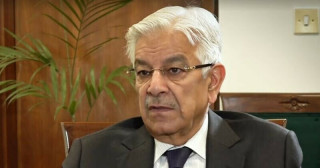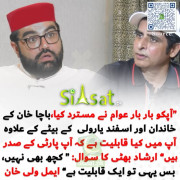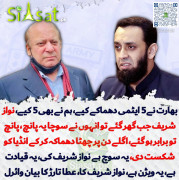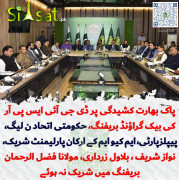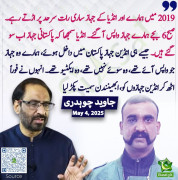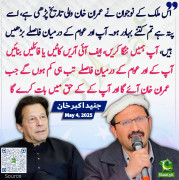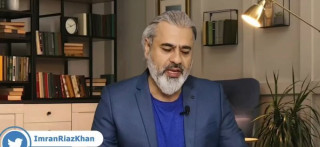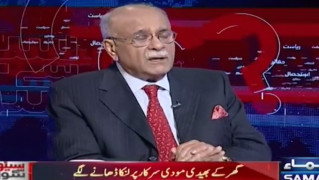It is very unfortunate that there is a lot of attepmts made to potray different images or rather distort the images of Allama Iqbal and Mohammed Ali Jinah in these days. First of all, you have to be very brave to claim having a good knowledge of the Holy Book and suggest any implications in the light of Quran.
Quoting Quranic verses and implying certain conclusions is very very dangerous thing to do as you are playing with words of Allah.
Here, in my opinion, Mubashir Luqman (although he gave clarification but it is same like slapping first and appologising after) and Mr scholar was attempting that as it was said in Quran that satan descend upon poets and by quoting this, they are targeting Allama Iqbal as he was the poet in question. Well it was clarified later in the same Sorah, I am giving exact translation of Pickthall
(220) Shall I inform you upon whom the devils descend? (221) They descend on every sinful, false one. (222) They listen eagerly, but most of them are liars. (223) As for poets, the erring follow them. (224) Hast thou not seen how they stray in every valley, (225) And how they say that which they do not? (226) Save those who believe and do good works, and remember Allah much, and vindicate themselves after they have been wronged.
According to Molan Maududi,
220-222
This implies the sorcerers, astrologers, fortune-tellers and conjurers who pose as knowers of the unseen and tell the people their future, or as wise men who have control over jinns and spirits and can make the destinies of the people through them.
223
This may have two meanings: (1) The satans somehow get a little hint of the truth and inspire their agents with it, mixing it with all kinds of falsehood; and (2) the deceitful, unscrupulous sorcerers hear something from the satans and then mixing it with falsehood, whisper it into the people's ears. This has been explained in a Tradition which Bukhari has quoted on the authority of Hadrat 'A'ishah. She says that when some people asked the Holy Prophet about sorcerers, he replied that they were nothing. They said, "O Messenger of Allah, they, sometimes, tell the right thing" The Holy Prophet answered, "That right thing is overheard by the jinns who whisper it into their friend's ear, who concocts a story by mixing a lot of falsehood in it."
That is, the people who follow and accompany the poets, are wholly different in, their characteristics, habits and temper from those who follow and accompany Muhammad (upon whom be Allah's peace). The difference between the two groups is so obvious that one group can be easily distinguished from the other. On the one side, there are the people who are characterized by the high seriousness, civilized and gentle behavior, righteousness and fear of God, sense of responsibility and a high regard for the rights of others; people who are fair and just in their dealings, . who do not utter a word except in the cause of goodness, who have a high and pure ideal before them, which they pursue with single-minded devotion and for whose attainment they expend all their energies and capabilities. On other side, there are the people whose only pastime is to portray erotic scenes of love and wine-drinking, mocking and jesting, satirizing and eulogizing, or to arouse feelings of hatred and enmity and vengeance against others, or to describe charms of unchaste women to the brothel or of chaste ladies in the houses, only for the sake of pleasing the people and winning their applause. From the crowds who throng the poetic sessions and follow the "famous" poets, one cannot help forming the impression that those people are free from every moral restriction, who have no object in life except to gratify the lusts of the flesh like animals, and who have no idea whatever of the higher and nobler ideals and ends of life. The person who cannot see the obvious difference between the two types is indeed blind. But if in spite of seeing and knowing the difference, only for the purpose of suppressing the Truth, he says that Muhammad (upon whom be Allah's peace) and his Companions are no different from the poets and their followers, he is not only a liar but has also transgressed all bounds of modesty and decency.
143That is, they follow no fixed pattern for their thought and speech. but wander aimlessly in every valley. Every new impulse makes them take up a new theme regardless as to whether it has any truth in it or not. Under one momentary impulse they would start uttering wise things; under another they would give expression to filthy and base feelings. If they felt pleased with somebody, they would exaggerate his praises, and if they felt offended by him, they would condemn him and run him down to hell. If they had a selfish motive, attached with somebody, they would feel no hesitation in giving preference to a miserly person over a generous person and to a cowardly person over a gallant person. On the contrary, if they felt displeased with somebody, they would not feel any shame in blotting his character and ridiculing him and his ancestors. That is why, one can tied God-worship and atheism, materialism and spiritualism, morality and immorality, piety and filthiness, seriousness and jesting, eulogy and satire expressed side by side in the poetry of one and the same poet. A person who is aware of these well known characteristics of the poets cannot reconcile himself to charging the recipient of the Qur'an with poetry, whose every discourse and word is clear and precise, whose objective is clearly defined, and who has never in his life uttered a word deviating in any way from the path of truth, righteousness and virtue.
At another place in the Qur'an, it has been stated that poetry is not suited to the temperament of the Holy Prophet: "We have not taught him poetry, nor does it suit him." (Ya Sin: 69). And this fact was fully known to the people who had any personal acquaintance with the Holy Prophet. Authentic Traditions show that he could not recite a complete verse from memory. If ever during conversation he remembered of a good verse of some poet, he would recite it without much care and regard for its meter and order of words.
Once Hadrat `A'ishah was asked whether the Holy Prophet ever made use of poetic verses in his discourses. She replied that he hated poetic verses the most, though sometimes he would recite a verse of a poet of Bani Quais, but in so doing he would unconsciously change the order of its words. When Hadrat Abu Bakr corrected him, he would say, "Brother, I am not a poet, nor composing poetry is my object. " Arabic poetry abounded in themes of sex and love romances, wine drinking, tribal hatreds and feuds, ancestry pride and vanity and made little or no mention of pure and noble themes. It was so saturated with falsehood, exaggeration, false accusations, undue praise , vanity, satiric invectives, jesting and polytheistic obscenities that the Holy Prophet once remarked: "It is better that the interior of one of you be filled with pus than with poetic verses" However, if there was something good in a verse, he would appreciate it, and say, "Some verses are based on wisdom." When he heard the verses of Umayyah bin Abi-Salt, he said, "His verse is a believer but his heart a disbeliever." Once a Companion recited a hundred or so good verses before him, and he went on urging him to recite more.
144This characteristic of the poets was just the antithesis of the Holy Prophet's conduct and practice. Everybody knew that the Holy Prophet said what he practiced and practiced what he said. The fact that there was complete conformity between his word and deed, could not be denied by anybody. On the contrary, everyone was well aware that the poets said one thing and practiced just the opposite of it. For instance, they would express noble themes of generosity, indifference to worldly wealth, contentment and self-respect in their poetry, but, in practical life, they would turn out to be extremely stingy and cowardly, avaricious and selfish. They would find fault with others on trifles, but would themselves be involved in grave moral weaknesses.
145Here those poets have made an exception from the general reproach, who possess the following four characteristics:
(1) They should be believers in Allah, His Prophets, His Books and the Hereafter.
(2) They should be pious in practical life and not sinners, nor free from moral restrictions to say whatever they like.
(3) They should be remembering Allah much in their day to day lives as well as in their literary work. It should not be so that their personal lives reflect God-consciousness and piety, but their poetry is replete with themes of debauchery and lusts of the flesh, or that their poetry is full of serious themes of wisdom and God-consciousness, but their personal lives are devoid of any trace of the remembrance of Allah. As a matter of fact, both these states are equally despicable. A good poet is he who is God conscious in his personal life and whose poetic talent and skills also are devoted to the advancement of the way of life followed by the God-conscious, God-fearing and God-worshiping people.
(4) They should not satirize others for personal reasons, nor take vengeance on others on account of personal, racial and national prejudices, but when they are required to support the truth, they should use their literary powers like weapons of war against the unjust and treacherous people. It does not behoove the believers to adopt a humble, supplicating attitude against injustice and oppression. Traditions show that when the unbelieving and mushrik poets raised a storm of false accusations against Islam and the Holy Prophet and spread the poison of hatred against the Muslims, the Holy Prophet urged and encouraged the poets of Islam to counter attack them. Once he said to Ka`b bin Malik, "Satirize them, for, I swear by God in Whose hand is my soul, your verse will be more effective and damaging for them than the arrow. " Likewise he said to Hassan bin Thabit, "Deal with them and Gabriel is with you". And, "Say and the Holy Spirit is with you." Once he said, "The believer fights with the sword as well as with the tongue. "
This is all quoted from Sayyid Abul Ala Maududi - Tafhim al-Qur'an - The Meaning of the Qur'an
If we look in the context of whole Sorah, it is obvious that it was Hazrat Mohammed and non-believer poets, who were against Islam, Allah was talking about and not those who were on the right paths. If we look at Allama Iqbal's poetry, it was all about teachings of Islam and nothing else. We forget to get message he was conveying but criticse him being a poet.
Quoting Quranic verses and implying certain conclusions is very very dangerous thing to do as you are playing with words of Allah.
Here, in my opinion, Mubashir Luqman (although he gave clarification but it is same like slapping first and appologising after) and Mr scholar was attempting that as it was said in Quran that satan descend upon poets and by quoting this, they are targeting Allama Iqbal as he was the poet in question. Well it was clarified later in the same Sorah, I am giving exact translation of Pickthall
(220) Shall I inform you upon whom the devils descend? (221) They descend on every sinful, false one. (222) They listen eagerly, but most of them are liars. (223) As for poets, the erring follow them. (224) Hast thou not seen how they stray in every valley, (225) And how they say that which they do not? (226) Save those who believe and do good works, and remember Allah much, and vindicate themselves after they have been wronged.
According to Molan Maududi,
220-222
This implies the sorcerers, astrologers, fortune-tellers and conjurers who pose as knowers of the unseen and tell the people their future, or as wise men who have control over jinns and spirits and can make the destinies of the people through them.
223
This may have two meanings: (1) The satans somehow get a little hint of the truth and inspire their agents with it, mixing it with all kinds of falsehood; and (2) the deceitful, unscrupulous sorcerers hear something from the satans and then mixing it with falsehood, whisper it into the people's ears. This has been explained in a Tradition which Bukhari has quoted on the authority of Hadrat 'A'ishah. She says that when some people asked the Holy Prophet about sorcerers, he replied that they were nothing. They said, "O Messenger of Allah, they, sometimes, tell the right thing" The Holy Prophet answered, "That right thing is overheard by the jinns who whisper it into their friend's ear, who concocts a story by mixing a lot of falsehood in it."
That is, the people who follow and accompany the poets, are wholly different in, their characteristics, habits and temper from those who follow and accompany Muhammad (upon whom be Allah's peace). The difference between the two groups is so obvious that one group can be easily distinguished from the other. On the one side, there are the people who are characterized by the high seriousness, civilized and gentle behavior, righteousness and fear of God, sense of responsibility and a high regard for the rights of others; people who are fair and just in their dealings, . who do not utter a word except in the cause of goodness, who have a high and pure ideal before them, which they pursue with single-minded devotion and for whose attainment they expend all their energies and capabilities. On other side, there are the people whose only pastime is to portray erotic scenes of love and wine-drinking, mocking and jesting, satirizing and eulogizing, or to arouse feelings of hatred and enmity and vengeance against others, or to describe charms of unchaste women to the brothel or of chaste ladies in the houses, only for the sake of pleasing the people and winning their applause. From the crowds who throng the poetic sessions and follow the "famous" poets, one cannot help forming the impression that those people are free from every moral restriction, who have no object in life except to gratify the lusts of the flesh like animals, and who have no idea whatever of the higher and nobler ideals and ends of life. The person who cannot see the obvious difference between the two types is indeed blind. But if in spite of seeing and knowing the difference, only for the purpose of suppressing the Truth, he says that Muhammad (upon whom be Allah's peace) and his Companions are no different from the poets and their followers, he is not only a liar but has also transgressed all bounds of modesty and decency.
143That is, they follow no fixed pattern for their thought and speech. but wander aimlessly in every valley. Every new impulse makes them take up a new theme regardless as to whether it has any truth in it or not. Under one momentary impulse they would start uttering wise things; under another they would give expression to filthy and base feelings. If they felt pleased with somebody, they would exaggerate his praises, and if they felt offended by him, they would condemn him and run him down to hell. If they had a selfish motive, attached with somebody, they would feel no hesitation in giving preference to a miserly person over a generous person and to a cowardly person over a gallant person. On the contrary, if they felt displeased with somebody, they would not feel any shame in blotting his character and ridiculing him and his ancestors. That is why, one can tied God-worship and atheism, materialism and spiritualism, morality and immorality, piety and filthiness, seriousness and jesting, eulogy and satire expressed side by side in the poetry of one and the same poet. A person who is aware of these well known characteristics of the poets cannot reconcile himself to charging the recipient of the Qur'an with poetry, whose every discourse and word is clear and precise, whose objective is clearly defined, and who has never in his life uttered a word deviating in any way from the path of truth, righteousness and virtue.
At another place in the Qur'an, it has been stated that poetry is not suited to the temperament of the Holy Prophet: "We have not taught him poetry, nor does it suit him." (Ya Sin: 69). And this fact was fully known to the people who had any personal acquaintance with the Holy Prophet. Authentic Traditions show that he could not recite a complete verse from memory. If ever during conversation he remembered of a good verse of some poet, he would recite it without much care and regard for its meter and order of words.
Once Hadrat `A'ishah was asked whether the Holy Prophet ever made use of poetic verses in his discourses. She replied that he hated poetic verses the most, though sometimes he would recite a verse of a poet of Bani Quais, but in so doing he would unconsciously change the order of its words. When Hadrat Abu Bakr corrected him, he would say, "Brother, I am not a poet, nor composing poetry is my object. " Arabic poetry abounded in themes of sex and love romances, wine drinking, tribal hatreds and feuds, ancestry pride and vanity and made little or no mention of pure and noble themes. It was so saturated with falsehood, exaggeration, false accusations, undue praise , vanity, satiric invectives, jesting and polytheistic obscenities that the Holy Prophet once remarked: "It is better that the interior of one of you be filled with pus than with poetic verses" However, if there was something good in a verse, he would appreciate it, and say, "Some verses are based on wisdom." When he heard the verses of Umayyah bin Abi-Salt, he said, "His verse is a believer but his heart a disbeliever." Once a Companion recited a hundred or so good verses before him, and he went on urging him to recite more.
144This characteristic of the poets was just the antithesis of the Holy Prophet's conduct and practice. Everybody knew that the Holy Prophet said what he practiced and practiced what he said. The fact that there was complete conformity between his word and deed, could not be denied by anybody. On the contrary, everyone was well aware that the poets said one thing and practiced just the opposite of it. For instance, they would express noble themes of generosity, indifference to worldly wealth, contentment and self-respect in their poetry, but, in practical life, they would turn out to be extremely stingy and cowardly, avaricious and selfish. They would find fault with others on trifles, but would themselves be involved in grave moral weaknesses.
145Here those poets have made an exception from the general reproach, who possess the following four characteristics:
(1) They should be believers in Allah, His Prophets, His Books and the Hereafter.
(2) They should be pious in practical life and not sinners, nor free from moral restrictions to say whatever they like.
(3) They should be remembering Allah much in their day to day lives as well as in their literary work. It should not be so that their personal lives reflect God-consciousness and piety, but their poetry is replete with themes of debauchery and lusts of the flesh, or that their poetry is full of serious themes of wisdom and God-consciousness, but their personal lives are devoid of any trace of the remembrance of Allah. As a matter of fact, both these states are equally despicable. A good poet is he who is God conscious in his personal life and whose poetic talent and skills also are devoted to the advancement of the way of life followed by the God-conscious, God-fearing and God-worshiping people.
(4) They should not satirize others for personal reasons, nor take vengeance on others on account of personal, racial and national prejudices, but when they are required to support the truth, they should use their literary powers like weapons of war against the unjust and treacherous people. It does not behoove the believers to adopt a humble, supplicating attitude against injustice and oppression. Traditions show that when the unbelieving and mushrik poets raised a storm of false accusations against Islam and the Holy Prophet and spread the poison of hatred against the Muslims, the Holy Prophet urged and encouraged the poets of Islam to counter attack them. Once he said to Ka`b bin Malik, "Satirize them, for, I swear by God in Whose hand is my soul, your verse will be more effective and damaging for them than the arrow. " Likewise he said to Hassan bin Thabit, "Deal with them and Gabriel is with you". And, "Say and the Holy Spirit is with you." Once he said, "The believer fights with the sword as well as with the tongue. "
This is all quoted from Sayyid Abul Ala Maududi - Tafhim al-Qur'an - The Meaning of the Qur'an
If we look in the context of whole Sorah, it is obvious that it was Hazrat Mohammed and non-believer poets, who were against Islam, Allah was talking about and not those who were on the right paths. If we look at Allama Iqbal's poetry, it was all about teachings of Islam and nothing else. We forget to get message he was conveying but criticse him being a poet.

